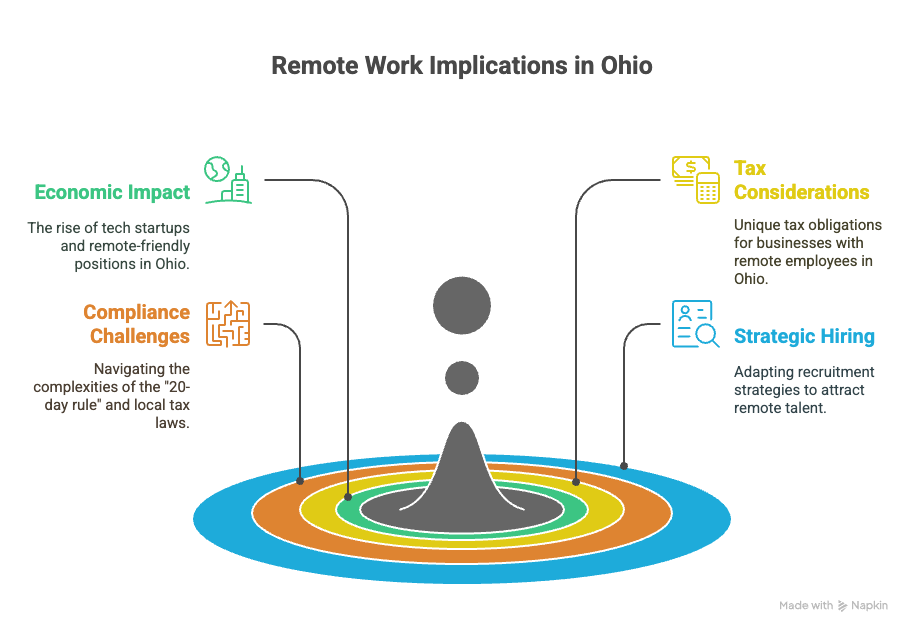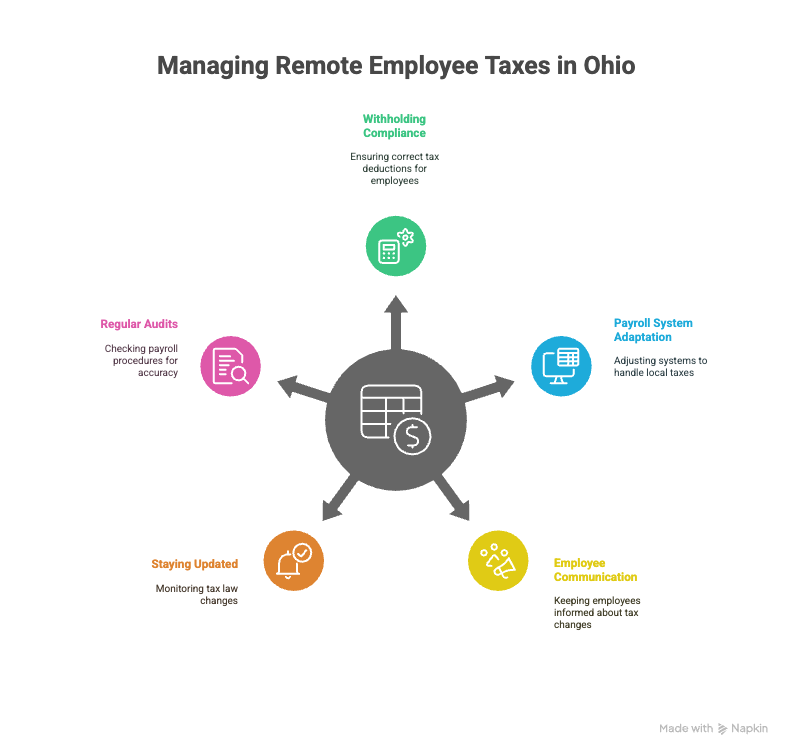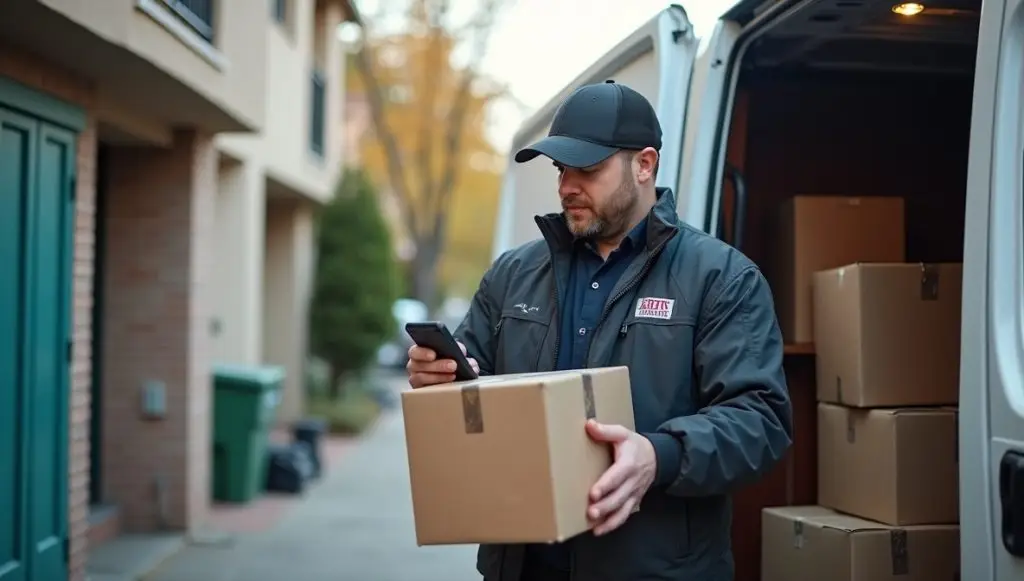The shift towards remote work, accelerated by recent global events, brings new challenges and opportunities for employers. While remote work offers flexibility and a broader talent pool, it also introduces complexities, particularly when it comes to state-specific tax regulations. In Ohio, understanding the nuances of remote work and taxes can have significant implications for employment practices, specifically background checks. This guide provides a comprehensive look at Ohio's unique landscape, examining how these factors intertwine and what they mean for businesses and their HR teams.
Key Takeaways
- Remote work is now a permanent part of many businesses in Ohio, influencing how companies recruit and organize their workforce.
- Ohio's municipal income taxes require careful management to ensure compliance when hiring remote employees across different cities within the state.
- Conducting background checks for remote hires in Ohio involves navigating data privacy concerns and fragmented information across jurisdictions.
- Hiring out-of-state employees introduces multi-jurisdictional challenges, requiring adherence to both Ohio and other states' legal requirements.
- Understanding and complying with Ohio’s tax regulations is crucial for managing payroll and avoiding significant penalties for remote employees.
Introduction
Remote work isn't just a trend anymore—it's the new normal, especially in places like Ohio. Companies have shifted gears to keep up with this change, expanding their talent pool far beyond their local area. But Ohio's particular tax laws make remote work a bit trickier than it seems at first glance.
Understanding these regulations is crucial. Why? Because it directly affects how you conduct background checks on potential hires. Tax obligations aren't just numbers on paper; they shape business strategies and employment practices. In Ohio, these considerations intersect sharply with background check processes, demanding an extra layer of diligence from remote employers. This article explores the implications for companies navigating this terrain, focusing on Ohio's unique landscape. It reveals why being informed isn't just helpful—it's essential for avoiding costly missteps.
Understanding Remote Work in Ohio
Ohio, with its diverse economy, has seen a significant rise in telecommuting. Various sectors here have embraced the flexibility that remote work offers. The state, known for industries like manufacturing and healthcare, now sees a growing number of tech startups and remote-friendly positions. This shift isn't just changing how companies operate but also altering how they recruit and manage their talent.
When it comes to taxes, Ohio presents some unique considerations for businesses with remote employees. For instance, the state imposes municipal income taxes. This means if your remote employees work from different cities within Ohio, you need to be aware of different local tax obligations. Keeping track of these can be crucial to ensure compliance and avoid penalties.

The tax situation becomes more complex with the impact of the “20-day rule,” which was modified temporarily due to recent legislative changes. It affects how taxes are withheld for non-resident employees working in Ohio. If your employees are spending significant time working across various Ohio localities, it's necessary to adjust payroll practices accordingly.
Overall, your understanding of Ohio's economic landscape and tax implications can help manage the risks and maximize the benefits of a remote workforce. Engaging with local tax professionals and regularly updating your knowledge on such regulations can save both time and resources in the long run. Have you considered how these factors might influence your approach to remote hiring? This is an essential question for anyone looking to expand their remote operations in Ohio.
Ohio Remote Work Background Checks
Ohio remote work background checks are crucial in ensuring that the individuals you hire remotely are fit for the job. These checks typically include verifying education, employment history, and criminal records. Verifying education confirms that the candidate possesses the qualifications they claim. Employment history checks help determine the candidate's past performance and reliability. Criminal record checks ensure that the candidate does not have a history that could pose a risk to your business.
In Ohio, conducting background checks comes with specific challenges. Data privacy is a major concern, with laws requiring you to handle personal information carefully. You must know federal regulations like the Fair Credit Reporting Act (FCRA) and Ohio's more specific privacy laws. These laws mandate obtaining clear consent from candidates before conducting checks and provide them the right to dispute inaccurate information.
Another challenge is accessing up-to-date and comprehensive records. Records in different jurisdictions might be fragmented, which complicates the picture you get of a candidate. This is particularly true for criminal records, where Ohio does not have a single central database accessible to the public.
If you're dealing with remote work, you're likely considering candidates who live outside your immediate area. This increases the complexity of background checks, with the need to comply with local laws governing those areas. Each state can have different rules on what background information can be gathered and how it can be used.
Staying informed about these aspects ensures your candidates are a good fit and protects your company from legal issues related to improper background checking. How can you ensure that your background checks comply with Ohio's regulations while still being comprehensive enough to provide the security you need?
Ohio Out-of-State Employee Screening
When hiring out-of-state employees under Ohio's jurisdiction, the complexities can increase. Each state may have its own set of laws and requirements that affect the hiring process. For Ohio businesses, this means additional layers to their screening practices.
Multi-Jurisdictional Challenges: Consider the differing regulations across states. Ohio background check norms may not align with those in other states. Employers face the challenge of adapting their processes to meet both Ohio’s and the employee’s local regulations. It's crucial to balance these differences to ensure compliance. For instance, some states have distinct rules about what can be included in a background check, such as salary history.
Legal Considerations: Ohio employers must navigate various legal aspects. For example, the Fair Credit Reporting Act (FCRA) applies across state lines, governing how background checks are carried out and how the information can be used. Additionally, some states have ban-the-box laws, limiting questions about criminal history in early hiring stages. Staying updated with these laws is vital. Knowledge of federal guidelines from the Department of Labor can provide clarity.
Best Practices: To conduct effective multi-jurisdictional checks, consider the following strategies:
- Standardize Procedures: Develop a consistent policy for conducting background checks. Even with variations between states, a standard approach can streamline the process.
- Collaborate with Legal Experts: Engage with legal advisors familiar with multi-state employment laws. They can help ensure that your practices remain compliant.
- Use Specialized Tools: Implement background check platforms designed to handle complexity across jurisdictions. These tools can provide insights into specific state laws.
- Regular Training: Train HR teams on the nuances of multi-jurisdictional hiring. Regular updates will keep them informed about changes in state regulations.
By addressing these challenges head-on, you can maintain a robust screening process that aligns with Ohio’s and other states’ requirements. Success in remote hiring requires staying active in evaluating these practices as regulations evolve.
Multi-Jurisdictional Checks in Ohio
When hiring remote workers across state lines, complexities in background checks arise. Each state has its own set of regulations, adding layers to the background screening process. For Ohio employers, knowing these regulations is crucial.
Ohio’s requirements might differ from those in states where potential hires reside. This could include differences in permissible criminal record checks or variations in data privacy laws. Employers must merge these distinct rules, especially when dealing with sensitive information.
To navigate these challenges, leveraging advanced background check tools is vital. Platforms like Checkr and GoodHire enable streamlined checks, accommodating multi-state requirements. They provide a centralized hub to handle complex legal frameworks across various jurisdictions.
Using technology alone isn't enough. Ensure your HR team is trained in multi-state compliance. Regularly update them on state-specific laws to avoid costly mistakes.
Consider partnering with legal experts who specialize in employment law. They can provide tailored advice, easing the integration of remote workers from diverse locations.
Multi-jurisdictional checks are intricate but manageable with the right strategy. By adopting proper tools and seeking expert guidance, you can confidently hire the best talent, wherever they are.
Ohio Telecommuting Compliance
Ohio telecommuting compliance involves navigating a mix of regulatory challenges. Employers must understand and abide by specific laws to manage remote employees legally. Let’s break it down.
First, think about Ohio's specific labor laws. These dictate how you should handle overtime, minimum wage, and licensure requirements for telecommuters. Ensure that every remote employee gets at least the minimum wage stipulated by Ohio law, even if they're officially working in another state.
Next, consider the Ohio laws on workers' compensation. If your employee works remotely from Ohio, they must be covered under your workers' compensation policy. This protects both you and your employees if workplace injuries occur at home.
Another key point is workplace safety. It applies to remote settings too. You must ensure that remote work environments meet safety standards. While this can be challenging, involving employees in self-assessment procedures and providing guidelines can help maintain safety compliance.
Moreover, familiarize yourself with the tax implications tied to remote work. Ohio requires that taxes be withhold based on where the employee is working, not where the company is located. Failing to do so can lead to significant compliance issues and potential penalties.
Communication is also crucial. Keep open channels to ensure remote workers understand their rights and your policies. Regular updates and training sessions help employees stay informed about compliance requirements.
Finally, audit your practices regularly. This can involve using compliance software or hiring external consultants to ensure you're up-to-date with Ohio’s telecommuting regulations.
By focusing on these areas, you can manage a compliant and effective remote workforce in Ohio.
Navigating Ohio Tax Regulations for Remote Employees
Ohio tax regulations impact how you manage remote employees, especially when it comes to payroll and HR practices. As a remote employer, you must understand the state's withholding tax rules. Ohio requires withholding for residents and non-residents earning in the state. This means you need to keep track of where your remote workers are living and performing their duties. Failing to withhold correctly can lead to penalties and unhappy employees.
Payroll systems must adapt to these stipulations. Ensure your system accounts for local taxes by identifying the primary work location of each remote worker. Communication with your team is essential. Let them know any documentation you need to adjust their withholding appropriately, such as a W-4 or equivalent. Such transparency builds trust and smooths the tax compliance process.

Staying updated on Ohio tax changes is another responsibility. Laws and rates can shift, affecting how you process payroll. Allocate time to review state announcements or consult a tax professional, if necessary, to ensure you're compliant. Have you considered what tools can streamline this process? Automation software often helps to track remote locations and adjust withholding taxes accordingly.
Regular audits of your payroll procedures can prevent issues before they arise. Cross-check employee addresses with their designated work locations and verify rates and regulations monthly. Simple oversight can lead to costly consequences. Are you prepared to tackle these challenges head-on? A proactive approach is your best ally in managing Ohio's complex tax landscape.
Conclusion
You’ve explored the intricacies of remote work and Ohio's tax landscape, delving into how these elements affect background checks. Ohio’s specific regulations pose unique challenges. By understanding tax implications and legal requirements, you’re better positioned to manage remote employees effectively.
Ohio employers should focus on staying informed. Regulations can shift, impacting your compliance. Regularly reviewing state laws and adapting your practices will help you navigate these changes. Use this knowledge to support your remote workforce, keeping compliance a priority while capitalizing on the growth of remote work. Stay proactive in understanding state tax laws and background check processes to remain competitive and compliant.
Frequently Asked Questions (FAQs)
Do Ohio employers need to check remote workers’ local laws?
Yes, if you hire remote workers in other states, you must comply with their local employment laws. This includes wage regulations, leave laws, and other employment standards.
How to verify education for remote hires in Ohio?
To verify education, request official transcripts or use third-party verification services. Ensure that candidates provide consent for background checks.
Can Ohio employers require drug tests for remote workers?
Yes, you can require drug tests, but it's essential to follow Ohio state guidelines and notify employees about testing policies from the start.
Are Ohio companies liable for other states’ background check laws?
Yes, if you hire employees from other states, you must comply with their background check laws. Not doing so can lead to legal issues.
How to handle county-specific checks for Ohio remote employees?
Conduct county-specific criminal checks as part of the background screening for employees residing in different counties. Use a reliable background check service familiar with Ohio’s counties.
Can a remote worker sue an Ohio employer for FCRA violations?
Yes, if you violate the Fair Credit Reporting Act during background checks, employees can file lawsuits. Ensure compliance with FCRA by obtaining consent and providing disclosures.
Do international remote workers fall under Ohio laws?
Generally, international workers are subject to the laws of their residing country. However, specific Ohio employment agreements might apply. Consult legal counsel for clarity.
Are Ohio gig workers considered remote employees?
No, gig workers, such as independent contractors, differ from employees. They are generally not classified under remote employee policies.
What’s the cost of multi-state checks for Ohio employers?
Costs vary based on the number of states and the depth of checks required. Typically, comprehensive checks range from $50 to $100 per employee.
Does Ohio require I-9 verification for remote hires?
Yes, all employees must complete I-9 verification. For remote hires, use authorized agents to review documentation and complete the process timely.
What are the tax implications for remote workers in Ohio?
Ohio remote workers must pay state income taxes. Employers must withhold taxes based on the employee’s work location and residence.
Can Ohio remote workers claim unemployment benefits?
Yes, if they meet eligibility requirements. Remote workers terminated without cause generally qualify for unemployment benefits in Ohio.
Are Ohio employers eligible for remote work tax incentives?
Currently, Ohio does not offer specific tax incentives for remote work. However, businesses may explore general state tax credits and incentives.
How should Ohio employers handle workers’ compensation for remote workers?
Ohio employers must provide workers’ compensation, covering remote work injuries. Clearly outline remote work safety guidelines to minimize risks.
Definitions
Remote Work
Remote work means employees perform their job duties outside a traditional office, often from home. In Ohio, this setup affects payroll, taxes, and compliance. For example, if an employee lives in a different city, the employer may need to adjust tax withholdings to fit local guidelines. It allows businesses to hire talent beyond their immediate location but comes with legal and administrative responsibilities.
Background Checks
A background check reviews a job candidate’s personal, professional, and criminal history. Employers often verify education, employment records, and criminal activity to avoid hiring risks. In Ohio, you must get the applicant’s permission first and follow federal rules like the Fair Credit Reporting Act. It's also important to ensure any data used is accurate and current.
Municipal Income Tax
This is a local tax imposed by individual cities in Ohio. Employers must withhold the correct amount based on where the employee works—not where the company is based. If your staff works remotely from different cities, you may need to handle multiple local tax rates. Not tracking this correctly can lead to fines or back payments.
Fair Credit Reporting Act (FCRA)
The FCRA is a federal law that regulates how businesses collect and use consumer data during background checks. It requires you to inform candidates, get their consent, and give them a chance to dispute errors. FCRA applies across all states, including Ohio. Failing to follow it can lead to lawsuits or regulatory penalties.
Workers’ Compensation
Workers’ compensation provides income and medical benefits to employees who get injured on the job. If your team works remotely in Ohio, they must still be covered. That means their home workspace is legally considered a work environment. It’s important to review policies and confirm coverage across various locations.
References
- Great Place to Work, Remote Work Productivity Study:
https://www.greatplacetowork.com/resources/blog/remote-work-productivity-study-finds-surprising-reality-2-year-study - Harvard Business Review, Executive Survey:
https://hbr.org/2023/08/survey-remote-work-isnt-going-away-and-executives-know-it - Ogletree Deakins, Ohio Supreme Court ruling:
https://ogletree.com/insights-resources/blog-posts/ohio-supreme-court-rules-that-municipalities-could-temporarily-collect-income-tax-from-remote-workers-during-pandemic/ - Ryan LLC, Morsy ruling on extraterritorial taxation:
https://ryan.com/about-ryan/articles/2024/remote-workers-facing-local-tax-issues/

GCheck Editorial Team
Meet the GCheck Editorial Team, your trusted source for insightful and up-to-date information in the world of employment background checks. Committed to delivering the latest trends, best practices, and industry insights, our team is dedicated to keeping you informed.
With a passion for ensuring accuracy, compliance, and efficiency in background screening, we are your go-to experts in the field. Stay tuned for our comprehensive articles, guides, and analysis, designed to empower businesses and individuals with the knowledge they need to make informed decisions.
At GCheck, we're here to guide you through the complexities of background checks, every step of the way.





